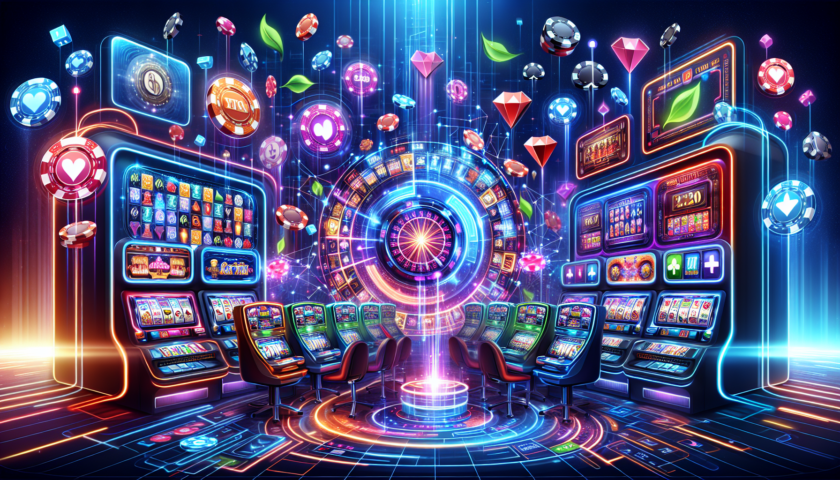Online gaming has evolved into a massive global industry, growing far beyond its origins as a niche hobby for dedicated enthusiasts. With millions of players around the world, Hoki805 online gaming platforms have become dynamic hubs where virtual worlds, social interaction, and advanced technology converge. However, despite the broad mainstream appeal, there’s a unique shift underway in the gaming ecosystem—one that is transforming how players connect, experience games, and even shape the virtual spaces they inhabit.
This article explores some of the emerging trends that are making online gaming platforms not just a space for entertainment, but a versatile environment that intersects with many aspects of modern life.
1. The Rise of Play-to-Earn (P2E) Platforms
The concept of Play-to-Earn (P2E) gaming platforms has captured significant attention in recent years. Powered by blockchain technology, these platforms allow players to earn cryptocurrency or digital assets as they engage in games. Unlike traditional gaming, where players invest time and money into entertainment with no financial return, P2E models offer real-world value through in-game rewards.
Platforms like Axie Infinity and Decentraland are pioneering this approach by integrating decentralized finance (DeFi) elements into gaming, creating entire economies within virtual worlds. These platforms enable players to create, buy, and sell in-game items, which can sometimes even lead to substantial real-world earnings.
This shift to earnable gameplay brings new dynamics to the gaming industry, allowing players to think about gaming not just as a pastime but as a potential career. For instance, professional “guilds” have formed, where players cooperate to maximize earnings, similar to a team of freelancers working together in a digital economy.
2. The Emergence of Social Platforms with Embedded Games
In the past, online gaming was often seen as a solitary activity, even though multiplayer games allowed for social interaction. Today, platforms like Discord and Twitch have blurred the lines between social networking and gaming. Discord has evolved from a simple voice chat service for gamers to a full-fledged community hub where users chat, share videos, and collaborate in virtual environments. Twitch, a popular live streaming platform, has not only changed how we experience games but also how we interact with the gaming community.
The integration of live streaming and social interaction has given birth to a new type of platform where gaming is just one of many activities. These platforms are more than just spaces to play games—they are social ecosystems, with activities like watching games, joining communities, and collaborating on content creation becoming integral parts of the user experience.
The next step in this evolution could be platforms where users can engage in a variety of virtual activities (e.g., watching movies, attending virtual concerts, or participating in live events) alongside gaming, creating an all-encompassing digital lifestyle.
3. Virtual Reality (VR) and Augmented Reality (AR) Integration
While online gaming has traditionally been enjoyed on a flat screen, virtual reality (VR) and augmented reality (AR) are taking the immersion factor to new heights. VR gaming, in particular, is creating platforms that allow players to step directly into the virtual world, offering experiences that feel more like a physical environment.
Platforms like Oculus are making VR more accessible, with games ranging from space exploration to physical sports, offering a level of engagement never before possible. VR platforms are also becoming social spaces, where players can meet other users and collaborate in entirely new ways.
On the other hand, AR-based platforms are enhancing physical-world gaming experiences. Games like Pokémon GO have demonstrated how AR can blend the real world with digital experiences. Future gaming platforms will likely see deeper integrations of AR, turning the entire world into a potential gaming environment.
4. Cloud Gaming: Breaking Barriers of Accessibility
Cloud gaming platforms like NVIDIA GeForce Now and Google Stadia (before its closure) are leading a significant shift in the gaming industry by making high-quality games accessible to anyone with an internet connection, regardless of their hardware capabilities. With cloud gaming, players can stream games from remote servers, bypassing the need for expensive consoles or PCs.
This development could drastically alter the landscape of gaming by democratizing access to top-tier gaming experiences. Players can enjoy AAA games on mobile phones, tablets, and even smart TVs, transforming almost any device into a fully capable gaming machine. As cloud infrastructure continues to improve, expect to see more cross-platform integration, allowing players to pick up where they left off on any device.


